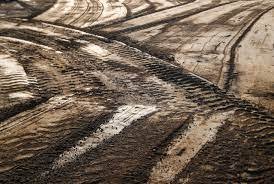Air pollution
Gravel pits pose a threat on the health of park goers and local residents.
INCREASED HEAVY VEHICLE EMISSIONS
The increased heavy vehicle traffic and extraction machinery pose these pollutant emissions risks:
Exhaust (NO2, nitric oxide, carbon monoxide and black smoke)
Evaporated Fuel
Tire and Break Wear
Stop-and-go traffic operations increase pollutant emissions, according to the EPA.
Depending on wind speeds, this air pollution could travel between 984-1640 ft. according to this study.
That’s at least 80 families affected. We counted.
This image shows how far air pollutants from the increased heavy vehicle traffic could travel.
SILICA EMISSIONS FROM MINING AND DRIVING
Beaver Materials uses a dredging process when they pull material from a wet pit.
In Mr. Beaver/Hamilton County Park’s 2022 re-filing, they included a Dust and Noise Study. It recorded dust emissions above EPA’s hazardous levels.
Encouragingly, the study showed that wetting down vehicular surfaces was an effective way to keep dust emissions underneath the EPA’s hazardous levels.
However, wetting down surfaces is clearly NOT done consistently at the Mr. Beaver’s active Strawtown pit. Check out the dust emissions covering the public road (State Road 37) just outside of the entrance of the pit.
If the city approves the gravel pit, oversight must be written into the plan. Accountability is necessary.
This is not River Road, so don’t compare it.
This gravel pit will be a ‘satellite site.’ No blasting, crushing, or processing– so a lot less airborne particulate should be present than River Road.
State Road 37 just outside of the satellite gravel pit on October 20, 2020.
What it means for you
Park goers, residents, and our local community could be exposed to a hazardous carcinogens, impacting their health for the rest of their lives. We need you to raise your voice to protect the health of our children.


